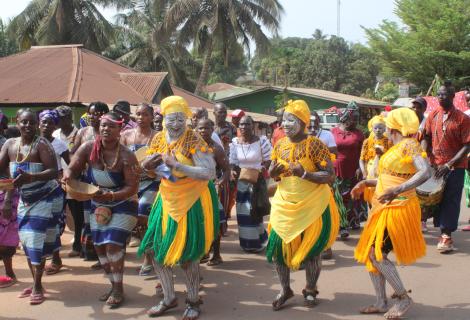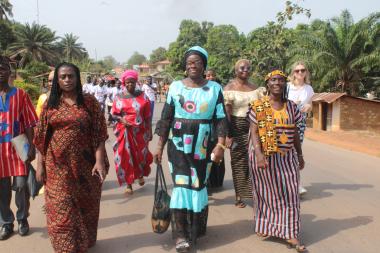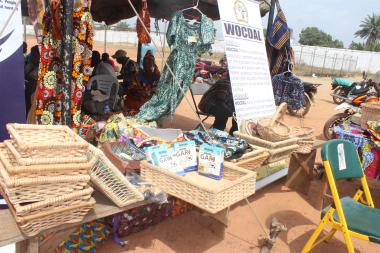Celebrating Women's Empowerment and Cultural Heritage: Cultural Festival Highlights Efforts to End FGM

Celebrating International Women's Day through Cultural Festival
GBARNGA: March 9, 2024** - ActionAid Liberia and Civil Society Organizations, in partnership with the Swedish Government, recently concluded a day-long Cultural Festival on Friday, March 7, 2024, in Gbarnga, Bong County, in celebration of International Women's Day.
The festival is part of the Just and Equal Communities project funded by SIDA through the Embassy of Sweden in Liberia, it highlighted vibrant cultural performances by traditional dancers from Bong, Montserrado, Gbarpolu, and Grand Gedeh counties. The theme of the event was "Promoting Positive Cultural Values and Eradicating Female Genital Mutilation (FGM)." Over 3000 people, including traditional women, students, and leaders, gathered at the Gbarnga County Field to participate in the festivities.

Madam Elizabeth Dato Gbah-Johnson, the County Director of ActionAid Liberia, emphasized the festival's goal of championing positive cultural values and raising
awareness about eradicating harmful practices like FGM in Liberia. She highlighted the adverse health effects of practices such as FGM and early child marriage on women and girls.
The festival also focused on implementing livelihood sustainability programs for traditional women transitioning away from harmful cultural practices. This included Palava Hut dialogues to raise awareness, strengthen legal frameworks, and advocate against FGM. Community voices, including practitioners and survivors, provided insights on FGM during the event.
During the dialogue session, traditional leaders raised community challenges and called on international partners for solutions. Keynote speaker Madam Nyamah Kollie proposed the establishment of "Heritage Centers" in FGM-practicing counties to support practitioners transitioning away from the practice.
Madam Mary Larteh, the Bong County Jorquelleh District #3 Commissioner, advocated for robust support for the Village Saving Loan Segment of Livelihood Sustainability to encourage traditional female Zoes' disengagement from harmful practices. Similarly, Madam Lorpu Kollie from Zota District suggested providing direct Livelihood Sustainability support to local chiefs, elders, and female zoes in their districts.
Representatives from the Ministry of Gender, UN Women, and the Swedish government pledged unwavering support towards providing necessary materials for traditional female Zoes as they disengage from FGM practices in Liberia.

The event concluded with viewing of traditional materials including organic crops harvested and processed. Awards and certificates were presented to the winners of the cultural performances, with Gbarpolu County securing the first award, followed by Bong County. Montserrado and Grand Gedeh Counties claimed third and fourth place, respectively.
It is noteworthy that the Gender-Based Violence Act, signed on September 11, 2018, by former President George M. Weah, prohibits all forms of gender-based violence. However, the component condemning FGM was removed from the GBV Act before its passage into law. ActionAid Liberia, Civil Society Organization and Women secretariat continue to advocate for the approval of the exclusive FGM Bill developed in 2017.
ActionAid Liberia (AAL), a human rights and social justice organization operating in Liberia since 1997, aims to advance the rights of women, children, young people, excluded and marginalized communities. They strive to shift the development paradigm to one that is people-centered, utilizing a human rights-based approach and an intersectional feminist analysis across all programs, campaigns, policies, advocacy, and partnerships.